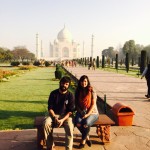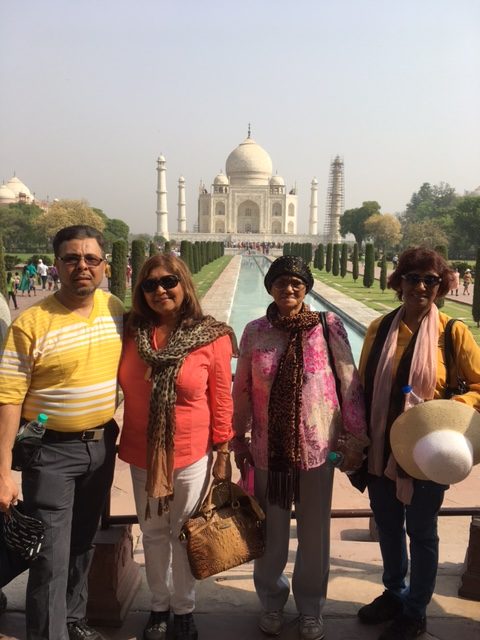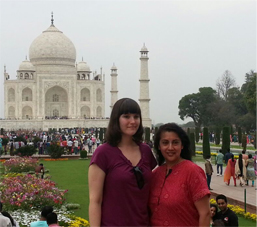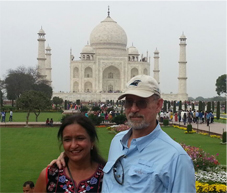Traveling in India and the subcontinent : Indivine Journeys at your service India is a vast sub-continent with a climate and customs all of its own. So before you embark on your holiday it is advantageous to check out a few facts to make your stay there as comfortable as possible. For your convenience, we have provided you with links to sites you can visit for more detailed information.
The following information is correct and valid at the time of publication, to the best of our knowledge. This advice is a genuine effort on our part to make your stay as pleasant as possible, but we regret we cannot accept any responsibility for any changes to the advice or information given.
Insurance : We strongly recommend that all travellers purchase adequate trip cancellation and interruption, medical and baggage insurance and carry the details of their coverage on tour. During plan for vacation you may firstly wish to check with your private insurance carrier regarding the terms of your coverage (or lack of coverage) outside your home country, including emergency medical evacuation.
Health : There are no compulsory vaccinations for travelling to India, although it is strongly recommended that you protect yourself during travelling against the following: Polio, Tetanus, Typhoid, Hepatitis A, Cholera and Malaria. We advise you to consult your doctor or the British Airways Travel Clinics, allowing at least 4 weeks before the date of travel for all medical advice. Some areas including Bhutan and Nepal may be at high altitudes so please check with our staff before confirming your itinerary. An inoculation against Yellow fever is required if you have visited any infected areas within 5 days prior to your arrival in India.
We strongly recommend our travellers to carry mosquito repellent lotions / cream during holiday tour.
Passports, Visas : Passports are required for all travellers. You will need a full 10-year passport, valid for at least 6 months beyond your planned return date of tour. Passports may be obtained by post from any Passport Office located in the travellers home country, and also through main post offices. Obtaining a passport may take up to 30 days time, therefore travellers are advised to obtain passports well in time for their travel, bearing in mind additional time may be needed to obtain a visa.Visas are required in advance of travel for entry into India, Nepal and Bhutan. Visas for travel to Sri Lanka and the Maldives are received upon arrival into those countries.
Visa for India – UK passport holders : The Indian High Commission in the UK has outsourced the Indian visa processing to VFS Global.
Visa for India – Canada passport holders may obtain visas through the Consulate-General of India. US passport holders may obtain visas through Travisa Outsourcing. The Indian Embassy and Consulates in the US have outsourced the Indian visa processing to Travisa Outsourcing.
Visa for Bhutan – UK, US and Canada passport holders : Bhutan visas are only available through an authorized travel company. Indivine Journeys obtains visas for all travellers to Bhutan. Visa applications and documentation will be forwarded to clients during the booking process, completed and returned to Indivine Journeys before your departure.
Visa for Nepal – UK, US and Canada passport holders : Applications for visa to Nepal may be obtained through the Nepal Consulate or consular section at the Nepal Embassy. While we encourage travellers to obtain visa in advance of travel, visas may be obtained on arrival into Nepal from the Immigration authorities at all entry points (with fees payable in £ or US$). Contacts in the UK, in the US or Canada www.nepalembassyusa.org
Climate : India is a vast country with complex seasonal and geographical variations in climate. Generally, the best time to spend your vacation in India is during the months of October through to April. The Monsoon season starts in mid May and continues through to the end of August. Most of the game sanctuaries of India are closed during the Monsoon period. During the summer months of May and June, the lower plains of the South and the desert areas of the North India are very hot and either dry in the North or humid in the South, while the hills and mountain regions provide a cool sanctuary for summertime holidays.
What to Wear : If you want to keep yourself cool in the Indian sun, a good supply of cotton clothing is essential along with a comfortable pair of open sandals. An effective pair of sunglasses and a wide brimmed hat will protect you against the strong rays, and it is advisable to use a high factor sun cream. In the cooler months, you will require some warm clothes such as light sweaters, jackets or shawls for the evenings. If your tour takes you to the mountain regions of India, then you will require warmer clothes. As it can sometimes warm up during the days, layers are always a good option along with comfortable walking shoes. For visits to the Game Parks, we recommend our travellers to wear light woolens and a windcheater as the early morning excursions can be quite chilly, with heavier clothing during the winter months of November to February. Khakis, browns or olive greens are best for blending into the environment. When visiting places of worship and mausoleums there are certain Indian religious customs to be observed. As a token of respect, it is customary to remove your footwear before entering all temples (a pair of light socks is useful if you prefer not to go barefoot), and dress should be fairly conservative, i.e. shorts are not really acceptable. In Jain and Hindu temples leather goods such as belts, shoes and bags will not be permitted.Visiting Temples & Religious Places : While visiting places of worship and mausoleums there are certain religious customs to be observed in India. As a token of respect, it is customary to remove your footwear before entering all temples. In Jain and Hindu temples leather goods such as belts, shoes and bags will not be permitted. The CitiesIndian cities are bustling and exciting, and in most areas, quite safe. There is little danger of being mugged on the streets here, but don’t be offended if the locals stare at you – the Indians are friendly and hospitable people and just curious. Almost all city-dwellers speak and understand English, and you will find all the street and shop signs in English as well. Should you get lost, the local people are so obliging that often you’ll find they will not only give you directions, but walk you all the way to your destination!
Photography
The Cities : India is a kaleidoscope of colour just waiting to be photographed, so wherever you travel be sure to carry your camera and an ample supply of colour film. Popular brands and speeds of film, especially the common 35mm format is widely available and not expensive.
Photography : With the exception of inside the Taj Mahal, the airports, and other restricted areas, you may photograph to your heart’s content although many popular sites will levy an additional charge for the use of your camera, or video camera which may cost a little more. Before you travel to India, please notify Indivine Journeys if you plan to bring a tri-pod apparatus with you to India as there are approvals required in advance of travel. Cabs and CarsThe majority of hired cars are chauffeur-driven in India. Hiring a taxi is no problem and quite reliable. To avoid any confusion over cost, settle the fare before you set off.
Gratuities & Tipping : This is entirely at your discretion. However, the following may be helpful. If service is not included in the bill, 10% is usually the accepted amount. Hotel and railway porters will expect about 50 rupees for one piece of luggage and about 200 rupees for a trolley full. At the end of your stay if you wish to tip your sightseeing guide and driver, an acceptable amount for the guide would be approximately between 400 – 500 rupees per day; and for the driver, it would be approximately between 200 – 300 rupees per day.
Currency : There are no restrictions on the amount of foreign currency or travellers cheques you may bring into India, provided a declaration is made in the currency declaration form given to arriving passengers. However, cash, bank notes and traveler cheques up to US $10,000 or equivalent need not be declared at the time of entry. For safety and convenience we would advise that you take the majority of your money in travellers cheques. It is advisable to change your money through authorized banks and hotels. Hotels are probably the most convenient option, as their rates are usually only a little poorer than the banks. Always keep your receipts, as you will need them at the end of your tour if you wish to convert your rupees back to your own currency. The units of Indian currency are the rupee and the paise. There are 100 paise in the rupee. Paper money comes in the denominations of 10, 20, 50, 100, 500 and 1000 rupees and coins are available in 1, 2 and 5. All major credit cards are accepted in most hotels and restaurants and government shops, as are travellers’ cheques in US dollars or Sterling. In Bhutan & Nepal India currencies are widely accepted but not INR 500 & INR 1000.
Dining : Avoid eating spicy foods when you first arrive in India, however tempting. Allow your system at least a day or two to get used to them, introducing one Indian dish with each meal for the first couple of days. After that it is best to stick with cooked foods, and remember to peel fruit before eating it. The best drinks to enjoy with your meals or to quench your thirst are the bottled mineral waters, other bottled drinks, coffee and tea. Indian beer is very good, along with Indian gin and vodka. The whiskey needs an acquired taste, and the imported scotch whiskey is very expensive as is the wine.
Shopping : India is a shopper’s paradise with the promise of some excellent buys! However, as a measure of precaution, always check on the levels of import duty levied for items that you wish to purchase. Many local shopkeepers may claim that there is no duty levied, but this could be incorrect information. Please try and carry back all the goods that you purchase with you to avoid storage charges. If you are planning major shopping, please seek information and advice from customs authorities before departing on your tour. When shopping for expensive items such as precious stones, carpets etc, the shopkeepers may guarantee the authenticity of the item, but expert knowledge is essential to ascertain their true value. For general shopping we recommend the Government Emporiums . You will find a huge choice of goods, from fashion bags and shoes, to Indian silks and handicrafts. Do not forget that any item that is more than 100 years old is banned from export out of the country, as is ivory, crocodile skin and other wildlife products. We pride ourselves on the quality of our sightseeing guides. However, if at any time you feel pressured by the guides to purchase any goods, we would be grateful if you would bring it to the attention and we will take immediate action and banned that guide or driver .Indivine Journeys has no recommended shops and does not guarantee the quality or authenticity of any store. So if you are buying any item from India then it is your responsibility to check the quality and price of product.
Please note that bargaining is common in India at most of the establishments except at the Government Emporiums where prices are generally fixed.
Traveling by Road Seat Belts : It is mandatory that all passengers/guides wear seat belts if driving in the front seat of a car.
Street Life : Indian cities are bustling and exciting, and in most areas, quite safe. Please do not be offended if the locals stare at you – the Indians are friendly and hospitable people and very curious. Almost all city-dwellers speak and understand English, and you will find that most of the street and shop signs are in English as well.
India is a developing country with an enormous and growing population. Social and economic development continues apace, and tourism income undoubtedly has it’s part to play, but you will certainly experience many of the inescapable symptoms of poverty during your tour, some of which can be shocking to western eyes. For obvious reasons, beggars will be attracted to tour parties, but we would ask that you do not give to them. Many of the beggars will be operating ‘professionally’, and regardless of this, giving to them simply perpetuates the practice. Alternatively, our ground staff, in all locations, will be happy to suggest a charitable institution should you wish to make a direct contribution.
Electricity : The electric current in India is 230-240V and electricity is widely available in the main towns, cities and tourist destinations. Sockets are the three round-pinned variety, similar (but not identical) to European sockets. European round pin plugs will go into the sockets, but as the pins on Indian plugs are somewhat thicker, the fit is loose and a connection not always guaranteed.
Food & Drink : In any holiday tour to India dinner is not included please budget for approximately $20/£14 per person for an evening meal without alcohol in good hotels. You will in general find meals very good value for money with a broad choice of cuisine in most hotels throughout your tour (Western and Asian). In remote and outlying areas of India you will find mainly local cuisine. It is suggested that at these times you order vegetarian food, as it tends to reduce the risk of upset stomachs! Avoid eating highly spiced foods when you first arrive in India, however tempting. Instead, allow your system at least a day or two to get used to them, introducing one Indian dish with each meal for the first couple of days. After that it is best to stick with cooked foods, and remember to peel fruit before eating it. The best drinks to enjoy with your meals or to quench your thirst are the bottled mineral waters, other bottled drinks, coffee and tea. Indian beer is very good, along with Indian gin and vodka. Indian wine is growing in reputation and can be most palatable, especially in the hotel restaurants. We recommend both the ‘Grover’ and ‘Sula’ vineyards. Local whiskey needs an acquired taste, and the imported scotch whiskey is very expensive, as is imported wine. Avoid drinking tap water at all costs!! The jugs of water supplied in hotel rooms is purified, but not guaranteed to be safe. Mineral water is very cheap and a far safer option for drinking and even cleaning your teeth, although do check the seal on the bottle is intact.
Notes : The above information is correct to the best of our knowledge and belief. It is current at the time of publication. We regret we cannot accept any responsibility for any changes on advice or information given. The advice given is a genuine effort on our part to make your stay as pleasant as possible.
India Travel : India is one of the attractive destinations in the world in terms of culture, architecture, history and legend that never fall short to mesmerize the tourist all over the world. India boasts of its diverse geography, religion, culture, tradition and ethnicity. In other words, India, land of unity in diversity, is said to be the most heterogeneous country in the world. Moreover, it is a mystical and spiritual place. The desert regions, the green valleys, the rain forests, beaches and the wild sanctuaries of the country and aspects of each city attract every traveller.Touring to India’s mystery magic lands and incredible destinations, you will get experience of lifetime. Among monuments and temples, the major spots for travellers which give authentic architectural and historical details are Taj Mahal, Qutub Minar, Red Fort, erotic temples of Khajuraho, Konark Temple, Agra Fort, Ajanta caves. All the spots are world renowned and Taj Mahal is one of the Seven Wonders of the World. Above all, if you want to get an unforgettable holiday experience during your India tours, visiting Rajasthan is a must.There are so many tombs and mosques, caves, doors and gates, forts and palaces, heritage palaces, temples in India which have always attracted people and have been among popular tourist destinations. India is also a home to some of the most famous National Parks, and Sanctuaries in the world. Also, India hill stations are among the top hill station in the world. Pilgrimage tourism, yoga and meditation destinations are extremely popular in India, too. Beaches of Goa and Backwater in Kerala are one of the most sought after spots in India because of their quality to stimulate and enliven spirits along with thrills and triumphs. Thus, come and explore this wonderful country which is immeasurably rich in sights, history, cuisine and spirituality!


 mazing vacation thanks to Indivine Journeys. I had traveled to India several times and had booked the hotel rooms, drivers, etc. thinking that (1) it would cost us less that way and (2) I would have m...
mazing vacation thanks to Indivine Journeys. I had traveled to India several times and had booked the hotel rooms, drivers, etc. thinking that (1) it would cost us less that way and (2) I would have m...  Hi Zaki: salaam . I want to thank you very much for planning an absolute wonderful vacation for my me n my husband, my mother n sister. The golden triangle tour was amazing n our driver and his son were so wonderful. We could...
Hi Zaki: salaam . I want to thank you very much for planning an absolute wonderful vacation for my me n my husband, my mother n sister. The golden triangle tour was amazing n our driver and his son were so wonderful. We could...  Dear Mr. Zaki, My daughter and I had a great time in India. Guide was extremely helpful in all aspect of handling the travel for us and made us feel very comfortable. Thank you again for setting up the trip for us. I think...
Dear Mr. Zaki, My daughter and I had a great time in India. Guide was extremely helpful in all aspect of handling the travel for us and made us feel very comfortable. Thank you again for setting up the trip for us. I think...  Thank you Mr. Zaki, Happy Holi to all in India. We had a wonderful time in India and we have lots of memories. Thanks for your hard work and attention to detail. We look forward to traveling with you again.
Thank you Mr. Zaki, Happy Holi to all in India. We had a wonderful time in India and we have lots of memories. Thanks for your hard work and attention to detail. We look forward to traveling with you again.